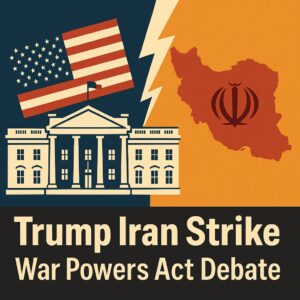
A Clash of Powers: President vs. Congress
Trump’s strike wasn’t the first time a U.S. president acted without prior congressional approval—but the timing was explosive. Domestically, Trump bypassed checks and balances. Internationally, the Middle East teetered on chaos as tensions between Israel and Iran escalated.
Critics argue Trump violated the War Powers Resolution of 1973, which requires the president to consult Congress before engaging U.S. forces in hostilities. Supporters countered he acted to neutralize an imminent threat and prevent a wider war.

What the War Powers Act Actually Says
Passed in the shadow of Vietnam, the law aimed to prevent unchecked military action by any president. It requires:
- Consultation with Congress “in every possible instance” before deploying U.S. troops.
- A formal report to Congress within 48 hours of military action.
- Withdrawal of forces within 60 to 90 days unless Congress approves continued action.
Trump did submit a report to Congress, stating the strikes were limited, targeted, and aimed at deterring future attacks. But many in Congress say this wasn’t enough.
History Repeats: Past Presidents Have Tested It Too
From Carter’s Iran hostage rescue to Obama’s Libya airstrikes, presidents from both parties have danced around the War Powers Act. George W. Bush sought full congressional approval before invading Iraq, while others like Reagan and Clinton often operated in legal gray areas.
Trump, however, joins a long line of leaders who leveraged Article II powers of the Constitution to justify military actions.
What’s Congress Doing Now?
Democratic Senator Tim Kaine and others are pushing a War Powers Resolution to formally restrict Trump’s military actions against Iran. The resolution could come to a Senate vote this week.
House members, including Democrat Ro Khanna and Republican Thomas Massie, are also working on a similar bill. They insist that any future offensive against Iran must be explicitly authorized by Congress.
Still, resistance is strong. Some Republicans defend Trump’s move, especially after his announcement of a ceasefire between Israel and Iran.
So, Did Trump Cross the Line?
Legal scholars are divided. Some argue Trump’s strike lacked a clear and immediate threat—thus failing to justify bypassing Congress. Others say the President acted within his constitutional authority to protect national interests.
Regardless, this latest move by Trump has pushed America back into the age-old constitutional debate: Who really decides when the U.S. goes to war?
As tensions simmer in the Middle East, one thing is clear—Washington’s internal battle over war powers is far from over.
